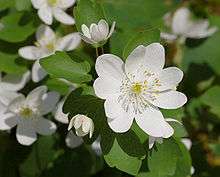Thalictrum thalictroides
Thalictrum thalictroides, synonym Anemonella thalictroides, the rue-anemone,[1] is a herbaceous perennial native to woodland in eastern North America. It has white or pink flowers surrounded by a whorl of leaflets and blooms in spring.
| Rue-anemone | |
|---|---|
 | |
| Scientific classification | |
| Kingdom: | Plantae |
| Clade: | Tracheophytes |
| Clade: | Angiosperms |
| Clade: | Eudicots |
| Order: | Ranunculales |
| Family: | Ranunculaceae |
| Genus: | Thalictrum |
| Species: | T. thalictroides |
| Binomial name | |
| Thalictrum thalictroides | |
| Synonyms | |
| |
Description
_(7361638674).jpg)
Thalictrum thalictroides is a hairless plant growing from a cluster of tuberous roots, with upright stems 10 to 30 cm (4 to 12 in) tall that end with flowers. The basal leaves have petioles (leaf stalks) 10–30 cm (4–12 in) long and leaf blades that are two times ternately compound. The leaflets are widely rounded in shape and the ends are three lobed.[2]
It flowers in spring and the flowers are borne singularly, or in umbel-like inflorescences with 3 to 6 flowers.[2] The flowers have short stems that hold the fully opened flowers above the foliage. The involucral bracts have three leaflets like the leaves. The showy rounded flowers have 4-15 carpels surrounded by many yellow stamens in the middle, and a cup of 5 to 10 white to pinkish-lilac petal-like sepals.[3][4] The sepals are about 5 to 18 mm (3⁄16 to 11⁄16 in) long and the filaments 3–4 mm (1⁄8–3⁄16 in) long.[2]
In late spring, 3 to 4.5 mm (1⁄8 to 3⁄16 in) long, ovoid to fusiform shaped fruits called achenes are released. The green achenes have 8 to 10 prominent veins and become dark brown when ripe.[2]
Taxonomy
_Eames_%26_B._Boivin_Rue_anemone.tiff.jpg)
Originally described as Anemone thalictroides by Linnaeus in 1753, it was transferred to a new, monospecific genus, Anemonella, by Édouard Spach in 1839.[5] Although similar to plants in the genus Thalictrum, Sprach considered the diminutive size, umbelliform inflorescence, and tuberous roots of this species to be distinctive enough to designate a new genus. Bernard Boivin considered this distinction suspect, and transferred the species to the genus Thalictrum in 1957.[6] Molecular evidence supports the placement of the species within Thalictrum,[7] and this placement is accepted by several modern treatments,[2] although The Plant List retains it in Anemonella.[8]
Similar species
The false rue-anemone (Enemion biternatum) is similar. It has single flowers that are always white and usually have 5 sepals. They appear individually in leaf axils on a branching stem.[9]
References
- "Thalictrum thalictroides". Natural Resources Conservation Service PLANTS Database. USDA. Retrieved 9 December 2015.
- Park, Marilyn M.; Festerling Jr., Dennis (1997). "Thalictrum thalictroides". In Flora of North America Editorial Committee (ed.). Flora of North America North of Mexico (FNA). 3. New York and Oxford – via eFloras.org, Missouri Botanical Garden, St. Louis, MO & Harvard University Herbaria, Cambridge, MA.
- Hilty, John (2016). "Rue Anemone (Thalictrum thalictroides)". Illinois Wildflowers.
- Tenaglia, Dan. "Anemonella thalictroides page". Missouri Plants. Missouri Botanical Garden.
- Spach, Édouard (1839). Histoire naturelle des vegetaux Phanerogames. 7. pp. 186–409.
- Boivin, Bernard (1957). "Études Thalictrologiques III: Réduction du genre Anemonella Spach". Bulletin de la Société Royale de Botanique de Belgique. 89: 319–321. JSTOR 20792255.
- Ro, K.; McPhearson, B. A. (July 1997). "Molecular phylogeny of the Aquilegia group (Ranunculaceae) based on internal transcribed spacers and 5.8S nuclear ribosomal DNA". Biochemical Systematics and Ecology. 25 (5): 445. doi:10.1016/s0305-1978(97)00029-x.
- "Anemonella thalictroides". World Checklist of Selected Plant Families (WCSP). Royal Botanic Gardens, Kew. Retrieved 2015-04-26 – via The Plant List.
- Chayka, Katy; Dziuk, Peter (2016). "Enemion biternatum (False Rue Anemone)". Minnesota Wildflowers. Retrieved 2017-05-01.
External links


- Thalictrum thalictroides in the CalPhotos Photo Database, University of California, Berkeley
- Thalictrum thalictroides on the Native Plant Identification Network (NPIN)
- Thalictrum thalictroides (Rue Anemone) page on Minnesota Wildflowers
- Thalictrum thalictroides page on Ontario Wildflowers
- Thalictrum thalictroides page in Michigan Flora
- Thalictrum thalictroides in Wildflowers of the United States
